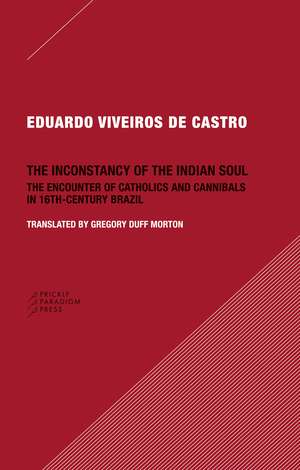The Inconstancy of the Indian Soul: The Encounter of Catholics and Cannibals in 16-century Brazil
Autor Eduardo Viveiros de Castroen Limba Engleză Paperback – oct 2011
In this pamphlet, world-renowned Brazilian anthropologist Eduardo Viveiros de Castro situates the Jesuit missionaries’ accounts of the Tupi people in historical perspective, and in the process draws out some startling and insightful implications of their perceived inconstancy in relation to anthropological debates on culture and religion.
Preț: 65.64 lei
Preț vechi: 83.87 lei
-22% Nou
Puncte Express: 98
Preț estimativ în valută:
12.56€ • 13.69$ • 10.58£
12.56€ • 13.69$ • 10.58£
Carte indisponibilă temporar
Doresc să fiu notificat când acest titlu va fi disponibil:
Se trimite...
Preluare comenzi: 021 569.72.76
Specificații
ISBN-13: 9780984201013
ISBN-10: 0984201017
Pagini: 104
Dimensiuni: 114 x 178 x 8 mm
Greutate: 0.09 kg
Editura: Prickly Paradigm Press
Colecția Prickly Paradigm Press
ISBN-10: 0984201017
Pagini: 104
Dimensiuni: 114 x 178 x 8 mm
Greutate: 0.09 kg
Editura: Prickly Paradigm Press
Colecția Prickly Paradigm Press
Notă biografică
Eduardo Viveiros de Castro is a professor at the National Museum of the Federal University of Rio de Janeiro.
Cuprins
Translation Note
I. The Problem of Unbelief in the Brazilian 16th Century
Culture as a Religious System
Of Hell and Glory
Division in Paradise
On the Hardness of Belief
II. How the Tupinambá Lost (the) War
Speaking of Time
The Old Law
The Juice of Memory
Recalcitrant Cannibals
In Praise of Inconstancy
Acknowledgements
I. The Problem of Unbelief in the Brazilian 16th Century
Culture as a Religious System
Of Hell and Glory
Division in Paradise
On the Hardness of Belief
II. How the Tupinambá Lost (the) War
Speaking of Time
The Old Law
The Juice of Memory
Recalcitrant Cannibals
In Praise of Inconstancy
Acknowledgements
Recenzii
“At once an anthropological interpretation of historical encounters between Europeans and ‘natives,’ a critically reflexive approach to anthropological understandings of ‘culture,’ ‘belief,’ and ‘identity,' and, perhaps most importantly for scholars working in Amazonia, a highly influential framework through which many ethnographers have come to understand indigenous cosmology and sociality. . . . Viveiros de Castro’s book has left an important mark on Americanist scholarship in recent years, and its translation should only extend its influence.”
